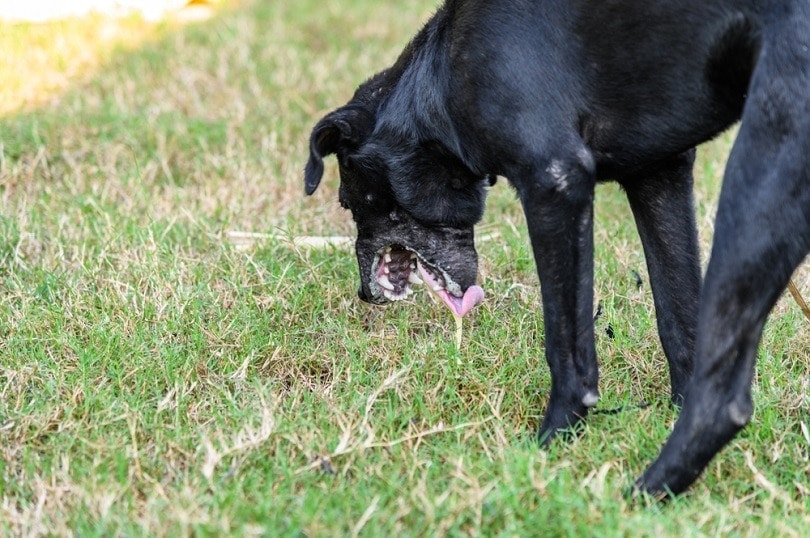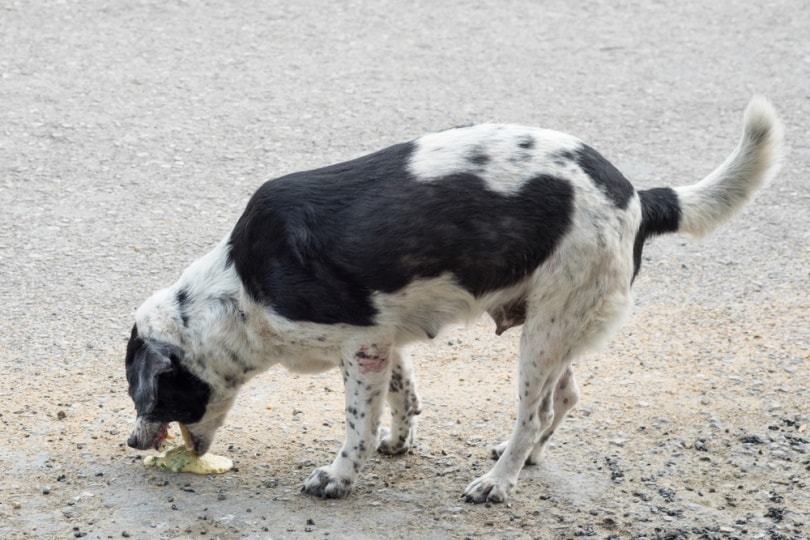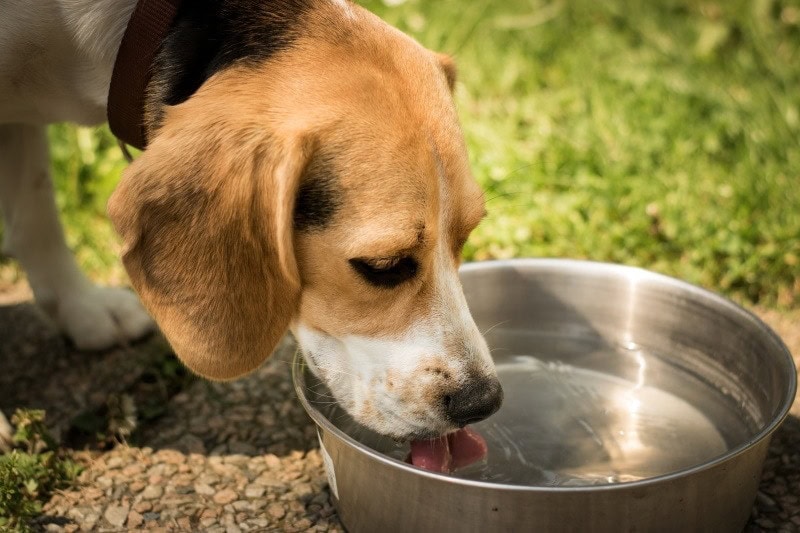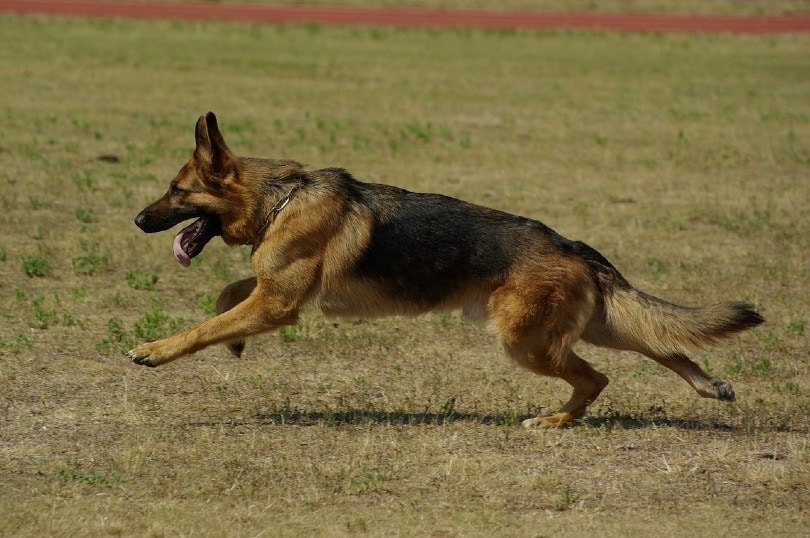Why Does My Dog Throw Up Water After Drinking? 9 Possible Reasons
Updated on

As pet owners, we’re always on high alert for any concerning symptoms our pets may be exhibiting. If your dog has been throwing up water after drinking, you might be rightfully concerned. This isn’t normal behavior, especially if it’s occurring consistently.
There are multiple reasons our dog might be vomiting after drinking, and while not all of them are a cause for concern, some definitely can be. Keep reading to learn nine potential reasons your dog is throwing up water and what you can do about it.
The 9 Possible Reasons Why Dogs Throw Up Water After Drinking
1. Laryngeal Paralysis
Laryngeal paralysis is a health condition that affects a dog’s larynx and causes it to not work as it should. The larynx is stabilized by the laryngeal muscles. When the nerves of these muscles become weak, they relax, which causes the cartilage to collapse inward.
There are a lot of potential causes for laryngeal paralysis, including throat or neck trauma, tumors, and hormonal diseases. Some dogs can even be born with the congenital version. This condition tends to affect older dogs and those in the medium to large breed size range. Aside from throwing up after eating or drinking, you may also notice the following signs:
- Coughing after exertion
- Noisy breathing
- Panting
- Bark sounds hoarse
- Gagging
This condition can become life-threatening if your dog becomes unable to take in the air that they need. Luckily, it can be treated with a surgical procedure.

2. Megaesophagus
Megaesophagus is not one single disease but instead a combination of many disorders where a dog’s esophagus dilates and begins to lose motility. This makes it difficult for the food to move into the stomach, causing both food and liquid to accumulate in the food pipe without a place to go.
Dogs with this condition may begin to regurgitate their water passively. You likely won’t notice any heaving or gagging before regurgitation. Megaesophagus can be caused by a variety of things, including trauma in the brain, esophageal blockage, inflammation of the esophagus, toxin exposure, or hormonal disease. Some dogs are born with this condition.
Other signs to be on the lookout for include:
- Bad breath
- Symptoms of pneumonia from aspiration
- Muscle weakness
- Wasting
The treatment of this condition will ultimately depend upon the cause. Your vet may simply wish to manage the symptoms your dog is exhibiting by preventing regurgitation. They may also prescribe a high-calorie diet or diets with a specific consistency that will be more likely to encourage the esophagus to move food and liquid to the stomach.

3. Blockage
If your dog is vomiting food or water and it is accompanied by gagging or stomach contractions every time they eat or drink, they may have a blockage. The foreign object they’ve ingested blocks the passage of food and water, which will lead to vomiting.
Blockages can occur if your dog eats something that it cannot digest. Partial blockages and polyps can cause similar symptoms. Signs to be on the lookout for aside from vomiting include:
- Loss of appetite
- Lethargy
- Weakness
- Diarrhea
- Straining to poop
If you suspect your dog has a blockage, a visit to the vet is in order. Blockages cause severe complications and can even be fatal. Your vet will perform a physical exam, take abdominal X-rays, and do bloodwork to determine if surgery is necessary to remove the blockage.
4. Drinking Too Fast
Sometimes throwing up after drinking is simply because your dog gulped down his water far too fast. Dogs tend to drink quickly after they’ve been outside in warm weather for a long time or after they’ve exercised. Drinking too fast stimulates their gag reflex and triggers vomiting.
If your dog is a chronic quick drinker, offer them only small amounts of water after their walks or exercise. You can also try placing a large, clean rock in their water bowl, so they have to make extra effort to drink around the rock.

5. Bacterial Contamination
It doesn’t matter if your dog’s bowl looks clean because chances are it isn’t. Bacteria can linger in your pet’s food and water bowls and contaminate them. This is especially true if you have water bowls that you leave outside.
Ponds and other stagnant pools of water can be contaminated by the waste of other animals or even humans, potentially exposing your dog to bacteria like Salmonella or Leptospira. You can reduce the likelihood of bacterial contamination by cleaning your dog’s indoor and outdoor water and food bowls every day.
Discouraging them from drinking water from unknown outdoor sources is another way to prevent throwing up after drinking.

6. Parasites
Parasites like Giardia and Cryptosporidium have been found in our drinking water and cannot only make us sick but our pets as well. These protozoan pathogens most often cause diarrhea, but when they reproduce in the intestinal tract, they can also cause vomiting.
Other common parasitic signs to be on the lookout for include:
- Fever
- Food intolerance
- Lethargy
- Exercise intolerance
- Weakness
- Weight loss
- Poor coat appearance
Treatment for Giardia and Cryptosporidium is on an outpatient basis most of the time. Your vet may recommend limiting food until your dog’s gastrointestinal symptoms subside and increasing fluids to prevent dehydration.

7. Blue-Green Algae
You already know that stagnant water found in pools and ponds can be a source of bacteria contamination, but these bodies of water can also contain toxic amounts of blue-green algae. This microscopic, plant-like organism naturally occurs in rivers, streams, canals, and small lakes.
Unfortunately, blue-green algae are often not noticeable on the surface of the water. Dense blooms, however, can make the water appear a bluish-green color or even form solid clumps.
Signs of blue-green algae poisoning include:
- Weakness
- Itching
- Lethargy
- Jaundice
- Excessive salivation
- Difficulty breathing
- Muscle rigidity
- Diarrhea
- Bleeding
- Shock
Keep your dog leashed around bodies of water, especially if the water looks dirty or foamy. Don’t let them drink from the water even if it looks safe.
If your dog has ingested water that is contaminated with blue-green algae, you need to get them to the vet as soon as possible. Prompt treatment is essential as the algae attacks fast. The sooner you can rid your dog’s body of the toxins, the better his prognosis will be.

8. Food Sensitivity
Vomiting in dogs may also be due to an upset stomach caused by food sensitivities. If you’ve recently changed your dog’s food and didn’t give him enough time to transition safely to his new food, it could be that your pup is dealing with an upset stomach, and that’s what’s causing his vomiting.
Avoid offering your dog table scraps or other human food as you never know how his body will react. If it is food sensitivity causing your dog to vomit after drinking, chances are you’ll also see food remnants in his vomit, too.

9. Dehydration
Dehydration can get serious very fast. If your dog becomes dehydrated, drinking water can wind up making them nauseous and causing them to throw up what they’ve drunk. This is excessively frustrating for pet owners because they need hydration, but how can they become hydrated if they’re throwing up what they’re drinking?
Other signs of dehydration include:
- Loss of skin elasticity
- Loss of appetite
- Diarrhea
- Lethargy
- Panting
- Sunken eyes
- Thick saliva
- Dry nose
If you suspect your pooch may be dehydrated and is constantly throwing up due to dehydration, you may need to offer electrolyte-enhanced fluids like Pedialyte. Talk to your vet about dosage recommendations beforehand, though.
Dehydration can become a serious medical emergency that will need veterinary intervention. Your vet can administer IV fluids to replace what your dog has lost and to prevent any further loss.

 Vomiting vs Regurgitation – What’s the Difference?
Vomiting vs Regurgitation – What’s the Difference?
Vomiting and regurgitation are two separate bodily functions in dogs. It’s important to know the difference as you will be able to determine which it is your dog is doing. Dogs cannot control when they vomit, but they do have control over regurgitation because of a voluntary muscle present in their esophagus.
When a dog vomits, its stomach ejects its contents through the mouth. It can cause intestinal fluids to be brought up. Dogs actively retch when vomiting, using their stomach muscles to force out the contents. The contents that are brought up come from the stomach or intestines and have a lot of fluid.
Regurgitation begins in the esophagus. A dog that’s regurgitating is essentially burping up materials as there is no movement happening in the abdominal muscles. Since the food never made its way to the stomach, it won’t be digested and will look like it did when your dog ate it. Water can be found in the regurgitated material but usually only in cases of megaesophagus.
Conclusion
The above nine reasons for dogs throwing up water aren’t the be-all, end-all. There are countless reasons why your dog could be vomiting his water, so it’s always best to consult the professionals if you’re concerned. Your vet can do a physical exam and run a few tests to determine why your dog is getting sick and provide them with a personalized treatment plan.
See also:
- Why Does My Dog Flip Their Bowl
- Why Is My Dog Drinking So Much Water? Vet-Reviewed Causes & Concerns
Featured Image Credit: Mumemories, Shutterstock


 Vomiting vs Regurgitation – What’s the Difference?
Vomiting vs Regurgitation – What’s the Difference?









